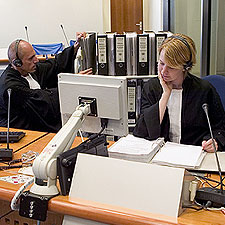
In addition to the administration of the courtrooms, the Registry assumes duties that are often afforded to ministries in national systems.
The unique character of an international criminal judicial institution puts the Registry at the center of a complex set of responsibilities in running the Tribunal. In addition to the administration of the courtrooms, the Registry assumes duties that are often afforded to ministries in national systems. Finally, the Registry fulfils the tasks of the administrative body of a UN organ.
Court Support Services activities imply the support of the work of the Chambers, the Prosecution and the Defence for the purpose of conducting trials. Hearings take place in the three courtrooms of the Tribunal, all equipped with state-of-the-art technology and accessible to the public. In court, the Registry is represented by court ushers and court officers. They keep official record of events in all hearings, administer exhibits and all filings submitted by the parties on the case.
The offices of the Registry are responsible for bringing witnesses to testify in court, protecting them when necessary and providing them with expert psychological support.
The Office of Legal Aid and Defence Matters ensures that all accused are duly represented. Its mission includes assigning defence counsel to represent defendants who can not afford to pay their own counsel (indigent defendants).
The smooth running of the trials is also made possible thanks to an extensive interpretation and translation effort. All court proceedings are interpreted and all documents used by the parties are translated into or from English, French, Bosnian/Croatian/Serbian (BCS) and/or Albanian and Macedonian.
Unlike in national systems, where detention matters are generally overseen by the Ministry of Justice, the UN Detention Unit (UNDU) in The Hague is supervised by the Registry. All accused are housed at the UNDU during trial. Most of them also spend the pre-trial period in detention. Because all accused are presumed innocent until proven guilty, the regime in the UNDU is quite different from that of a prison which is reserved for convicted criminals. The Registry ensures the UNDU meets the highest international standards for detention.
Another element of the Registry´s work is its diplomatic function. It is responsible for contacts between the Tribunal and the international community, addressing a host of issues including cooperation of member states, enforcement of sentences and the relationship with the authorities of the Netherlands, the host country of both the Tribunal and the UNDU.
Finally, the Registry acts as the administrative organ of a UN body. This responsibility spans a wide range of services, such as public information, security, travel, human resources, finance services, archiving and visits, to name but a few.
As a matter of fact, the Registry is the most diverse of the three Tribunal bodies. It oversees a myriad of functions, unlike most other types of UN bodies.
The Registry is headed by a Registrar, appointed by the UN Secretary-General. Mr. John Hocking, from Australia, has been Registrar since 15 May 2009. He was Acting-Registrar in the period from 1 January 2009 until his appointment. Previous Registrars were Mr. Hans Holthuis (2001-2008), Ms. Dorothee de Sampayo Garrido-Nijgh (1995-2000) and Mr. Theo van Boven (1994), all Dutch nationals.

